Why dumping rubbish is a waste of money
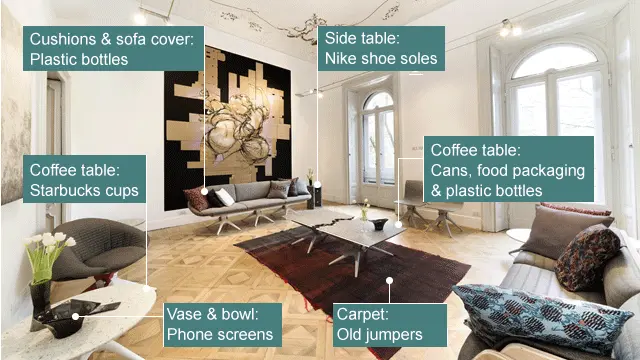 Miniwiz
MiniwizFurniture made from cigarette butts and Nike shoe soles, rugs from old jumpers, and fruit bowls from smartphone screens - welcome to the House of Trash, which opened in Milan earlier this year to show the world's design capital that landfill can be lifestyle.
The company behind the project - Miniwiz - is the brainchild of Arthur Huang, an architect and structural engineer. Increasingly shocked by the amount of consumer waste being dumped, he set out to explore alternatives.
"I knew that just hating waste won't make it go away," he says.
"There's already enough metal, enough plastic to support our economy many times over. There's a huge abundance of premium grade trash to use and re-use as base-source content for new products."
Miniwiz sees waste as a valuable resource, not rubbish. Some 70 engineers and scientists in its Trash Lab - out of 80 staff in total - collect consumer and industrial garbage and process it for re-use.
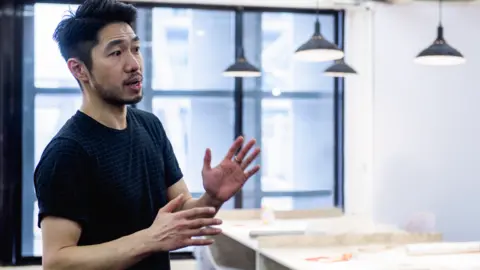 Miniwiz
MiniwizThe 13-year-old Taipei-based firm has created 1,200 new materials, many of which are being used in fabric, construction, consumer products and - perhaps most ambitious of all - the wings on a two-seater aircraft that Mr Huang intends to fly (once he's finished his pilot training).
"We will fly with a trash wing," he says proudly. "We had to invent a new material. It's a carbon fibre-like material. It's taken two years' R&D (research and development), but we're almost there."
Miniwiz has created a miniature wind turbine and solar panel from electronic waste and paper that can charge smartphones.
And in 2010 it built a nine-floor 130-metre building from bricks made out of 1.5 million plastic bottles for a Taipei garden festival - fully tested for structural strength and with retardants against fire risk.

Circular Economy
The BBC's Circular Economy series highlights the ways we are designing systems to reduce the waste modern society generates, by reusing and repurposing products.

Mr Huang admits not all the materials are fit for purpose (a small boat sank). "But we must not be afraid to fail," he says, although he's had enough successes to win the 2015 Davos World Economic Forum's Technology Pioneer Award.
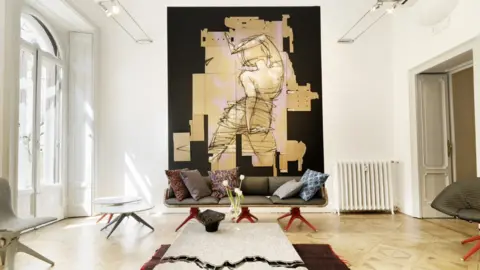 Miniwiz
MiniwizTurning base metal into gold is only part of the challenge, however. Persuading manufacturers to use recycled material and convincing consumers they are fit for purpose has its own problems.
Says Mr Huang: "The most sophisticated textile plants and machine manufacturers will not use recycled materials, because it requires investment and they don't see a market. Manufacturing processes are optimised for linear supply chains. It's a chicken and egg situation."
Miniwiz is trying to create a silk-like material out of plastic. "We feel like we're getting close, but take-up is still very slow.
"If someone wants a silk shirt, they want a certain feel and quality, a certain weight. When a designer looks at our stuff, they say: 'Great concept, great idea, but it's just not up there.'"
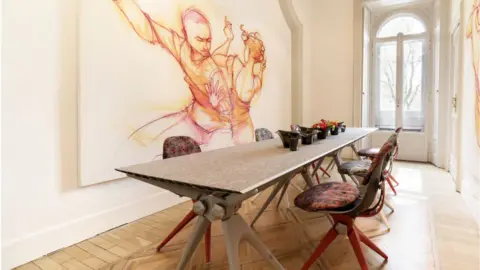 Miniwiz
MiniwizUndeterred, Miniwiz is turning the House of Trash into a community office and display centre which he hopes will become a hub for working with recycled materials. "We want to work with the new generation of creatives and designers," he says.
He does, however, already work with big names: Nike, Coca-Cola, Marriott hotels and Starbucks.
At Marriott, Miniwiz is trying to develop a pillow that matches the hotel chain's existing products. At Nike, it's working on recycled sneakers.
Says Mr Huang: "I get to play with their data. At Nike I get to know the specification of a fine knit shoe. How strong is the yarn? What is the weather-proofing?
"We want to create recycled materials that compete with existing performance."
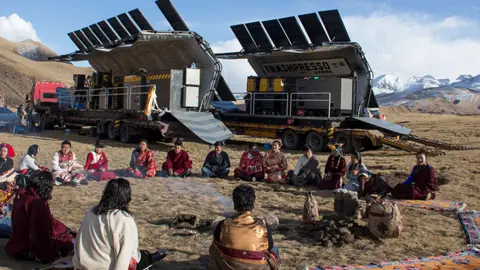 Miniwiz
MiniwizTom Szaky, founder of US-based TerraCycle, is a huge admirer of Miniwiz. "They're doing amazing things," he says.
New Jersey-based TerraCycle specialises in the recovery of ocean plastic and works with major companies on recycled packaging. It has a crisp packet recycling operation with Walkers in the UK, and a scheme in Mexico for re-using chewing gum in packaging.
"Everything in the world can be recycled," says Mr Szaky. His firm is establishing a diagnostic division, where such diverse products as children's nappies and toothbrushes are not just recycled, but tested for health purposes.
"It's about showing what the future of recycling could mean," he says.
For such companies, recycling is about proving the possible. Take Miniwiz's Trashpresso machine, a mobile solar-powered rubbish composter about the size of a shipping container.
It shreds, cleans, heats and reformulates rubbish - mostly plastic - into tiles that can be used as building material or for injection moulding.
The initial idea came from Jackie Chan, who featured Mr Huang in his Green Heroes documentary. Fed up with the amount of waste left on film sets, Mr Chan began wondering if a portable recycler was feasible.
To demonstrate its potential two machines were hauled to a Tibetan village where locals had complained about tourist rubbish clogging the water system.
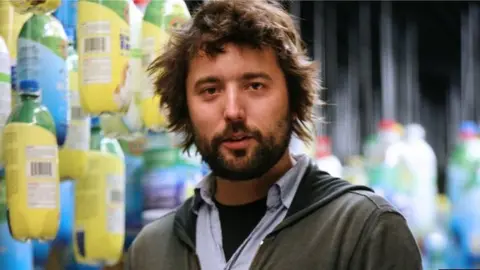 TerraCycle
TerraCycleDespite such inventions, a truly circular economy remains far off due to the costs of collecting and processing trash, says Mr Szaky. "The value of garbage is far below the cost of recycling it."
Governments could address this market imbalance through tougher legislation, but Mr Huang also wants countries to commit a percentage of their procurement budgets to recycled products.
"It would open the floodgates for all sorts of technological innovation," he says.
For Mr Szaky, it is consumers who have the real power. "When consumers make the right choices, producers and retailers will follow."
Firms like TerraCycle are not without critics, however. Some say they legitimise single-use materials by offering hope that everything can - or will - be recycled.
Says Mr Szaky: "I understand the argument. Companies like mine, or Miniwiz, are reactions to a negative. In an optimal world we would not exist."
But that doesn't solve the immediate waste crisis.
